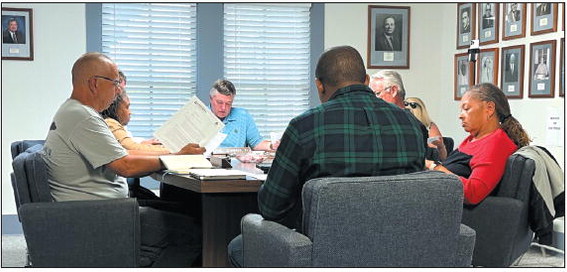For Wheeler, FAST Was the Answer
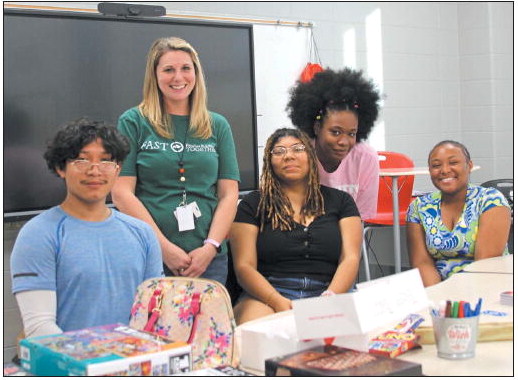

Program Unites Families, School, Community to Help Children Thrive
When Wheeler County educators were searching for innovative ways to ramp up parental engagement in their children’s academic experience, Families and Schools Together (FAST) appeared to be the answer.
While expectations were high for the program’s local impact, based on its solid reputation for effecting change — worldwide — no one anticipated just how enthusiastically FAST would be embraced by the community. School, parent, and community partners laid a
“The unique thing about FAST is that it covers what humans need — love and support. So, everywhere you go, it is going to work the same way. It doesn’t matter if it is located in a rural or urban area of the United States or in a different country.”
– Donetta Bracey, FAST Trainer-Supervisor continued from page
firm foundation for the program’s future in Wheeler County.
It all began with a grant and a vision. Wheeler County School System was among 74 districts across the state to garner a $175,000 grant that enabled the launch of FAST in Wheeler County. Superintendent Suzanne Couey announced the Safer Georgia Schools Grant award at the September 11, 2023, meeting of the Board of Education.
Couey said the Safer Georgia Schools Grant would support implementation of FAST which is designed to “make a significant, long-lasting impact on child and family behaviors.” The initial plan was for the district to implement two FAST cycles (one each semester) in each of its three schools (elementary, middle, and high schools) with teams comprised of parents and school and community representatives. When FAST launched in Wheeler County at the beginning of spring semester 2024, about 20 local families with students in elementary and middle school, had agreed to participate.
About FAST
FAST is a Georgia Department of Educationendorsed, internationally acclaimed program shown to help children succeed at school by building stronger, more supportive relationships at home. Founded on evidence-based practices and rigorously tested, FAST empowers parents to become more effective family leaders, connects families to schools, and creates a community engaged in children’s well-being and education.
FAST partners with community-based organizations and schools across the U.S. and internationally, to implement its programs. The organization provides training, support, and technical assistance for: school teams looking to run its programs for families (FAST Program); and educators looking for training and coaching on equity-focused best practices (FAST Institute).
Research shows the impacts of family engagement: stronger academic success and better school attendance for children, increased skills among parents to advocate for their children, and more collaboration between families and schools. The program acknowledges and honors family assets and strengths, and because the contributions of the family are emphasized, parents gain confidence and are more engaged in education at school and home.
As a nonprofit, Families and Schools Together has transformed tens of thousands of lives and continues to evolve and adapt to meet each community’s unique needs. Therefore, the program looks a little different in each community. The program’s mission is to nurture the inherent potential of every child by uniting families, schools, and communities. Its vision is a world where every community and every child thrives.
Developed in 1988 in Madison, Wisconsin, by Dr. Lynn McDonald, a professor of social work and an education researcher at the University of Wisconsin- Madison, FAST was founded in 1999 through McDonald’s efforts to bring FAST to new communities and has been serving children and families ever since. Now, FAST programs are operating in 48 states in the U.S. and in more than 20 countries internationally.
How It Works
The FAST Program supports child well-being and learning readiness, empowers parents, and builds social capital so children can thrive. It is designed to: Strengthen family relationships and increase cohesion Engage parents more with the school and enable them to advocate for their children’s education Connect families to other families and community resources to reduce isolation and stress The program is run at a school or community organization and meets weekly in 2.5-hour sessions, which can be offered in-person or virtually, over an eight-week (or 10-week) cycle. A site will typically run two cycles per school year.
During these sessions, families eat a meal and play games together, parents discuss and bond over shared experiences, kids and youth make friends with their peers, and parents engage in one-on-one special play/ conversation time with their children free from distraction.
A trained FAST Team of local parents, youth (for middle and high school levels only), educators, and mental health and other community professionals facilitates the program and provides coaching and support to the participating families.
Local Success
On graduation night for the Wheeler program, FAST Trainer-Supervisor Donetta Bracey was in attendance. She was there not only to witness the culmination of the first FAST program, but also to monitor. It was her third visit to Wheeler School where she began with training teams that would facilitate the program. She then conducted overviews of the program function at its mid-point and end. At the site visits, she looked for parents being engaged, if families were attending regularly, and whether the sessions were meeting goals and values of FAST.
Were the programs bringing families into schools and giving support? Bracey liked what she saw. “One reason for different partners on the team — school, community, parents — is to help guarantee we are covering all needs families may have. I have been really bragging on this site. It is so unique; it’s a little area, but families are participating. Typically, it’s hard to recruit families, but these numbers are large.”
She emphasized, “This has been successful, and I know why. I have been training for 23 years, and I know if the head is good and believes in the program, everything will fall in place. Suzanne Couey had vision and put the right people in place; she recruited team members that had the same vision as she had.”
Bracey explained, “We see team members as coaches. We see parents as leaders, and we want the children to see the parents as leaders.” At the end of the program, parents complete a survey and FAST will compile a report, based on this survey. This information is added to the observations made by the program monitor. Later, teams will convene for an evaluation of the program and to determine whether the program met criteria to be certified to provide future training. “I can tell you right now this site will be certified, so they will be able to continue FAST without seeing a trainer again.” In order to maintain certification, Wheeler will have to maintain 50% of its original team, which trains new team members. “We hope it will continue for many years,” Bracey said.
Bracey is based in South Carolina, but the program is based in Wisconsin. She has trained teams near to Wheeler in Bleckley County, where the program has been underway for several years. She has also trained abroad, including England. “The unique thing about FAST is that it covers what humans need — love and support. So, everywhere you go, it is going to work the same way. It doesn’t matter if it is located in a rural or urban area of the United States or in a different country.”
She expounded, “Our mission and primary goal is to bring the community together to help the children of that community, in every way, not only at school, but at home. That’s why FAST invites the entire family to participate in the program. We feel like everybody in that household will have an impact on that child. I am sure you’ve heard the saying, ‘It takes a village to raise a child.’ That is basically what FAST is all about. You have to have a connection with the school, the family, and neighbors in order for kids to succeed. “
Bracey also noted that the program thrives on “family time, such as eating together for at least one meal a week, and playing games together. That is important. Reading is a big part of FAST, if children have the basics of reading, everything else will follow. We will push for that happening in Wheeler.”
Kerri Henderson, who is part of the team that facilitated the FAST program, is a kindergarten teacher in Wheeler County. But she was not participating as an educator; she was there as a parent partner for the parents of elementary students with whom she was working. “I have two children in the school system, one in Pre-K, and a second grader,” she said of her connection as a fellow parent with the group. Most of the time Henderson spent as a partner was in coaching parents and empowering them to make choices. “I facilitated discussions with parents about issues, or any topic they wanted to bring up,” she said, noting that parents guided the direction of the discussions. “This is parentled. I am simply here to lend support,” she explained.
The topics covered during parent discussion groups were diverse: how to tap into community resources and services; how to be more assertive in asking questions; and strategies for continuing the FAST momentum after the program ended. While the parents meet, their children are engaged in a range of fun and educational activities, including reading, playing dodge ball in the elementary school’s indoor gymnasium-auditorium, or arts and crafts.
Sherry Harris, who has children in kindergarten and ninth grade, participated in FAST as an elementary parent. “The program was good for me because things have changed over years. I have connected back to what I was used to then,” she said of parenting her older children, then parenting her young daughter in a different era. She has revived skills developed from parenting her older children, but also reinforced her foundation with new information in a rapidlychanging world.
She has been reminded of the value of one-on-one time with her young daughter, “Taking 15 minutes out of the day, to ask, ‘How was your day?’ This has taught me a lot about connecting with my child and what is going on at school. It has helped me reset priorities.”
The entire Harris family has been impacted by FAST and positive change has occurred at home. They are having more meals together at the kitchen table. They are playing board games and spending more time outside. “She has changed, she really likes the attention,” Harris said about her daughter. “This has made me realize she needs more attention, and now we are seeing a different behavior. We go outside and kick the ball; we are connecting more emotionally as opposed to being on an I-PAD with no one-on-one time.”
Harris was a paraprofessional in the school system for 12 years before she started work at the prison facilitating college programs. She has been an educator for 24 years and her life is busier than ever. “How did I make time for this? Oh, I made time for this,” she remarked about the program’s importance. Now, Harris’s daughter asks her mom if she had a good day at work. “She asks me, ‘Did you have to fuss at anyone today?’ I look at her homework. She spends more time with her Dad.”
Harris said the group of elementary parents bonded and actually wants to continue their relationship going forward. ‘We agreed to be there for one another.” Harris said, adding that the group will look into FASTWORKS, an independent program for parents who have completed the FAST program.
Couey is pleased with the outcome of the first FAST effort. She chose the FAST formula for Wheeler County because of its focus on family. “I wanted to look at the social-emotional side, especially after COVID.” The negative effects of the pandemic of 2020 are still being seen — both academically and emotionally — with students. “I knew Bleckley County Schools had done FAST for several years. I had been thinking about it for a couple of years, but was waiting for funding.”
She noted, “It has actually gotten a good start here. At first, it was difficult getting the families engaged, but I think word has gotten out now and families are asking if they can be a part of it next year.” Couey wants to implement FAST in the high school next year, so that all three school levels will participate in the new term. “It depends on getting families to participate,” she said, adding that middle and high school families are often involved in sports and other activities on school nights when the program is held, so some adjustments may have to be employed to make it all work.
The funding for next year is in place, but after that, new grants and sponsorships will have to be tapped to continue the program. “We will need community support to keep it going, so we will look for other grants and community partnerships. We might have to be creative, but I think it is worth it,” Couey avowed.
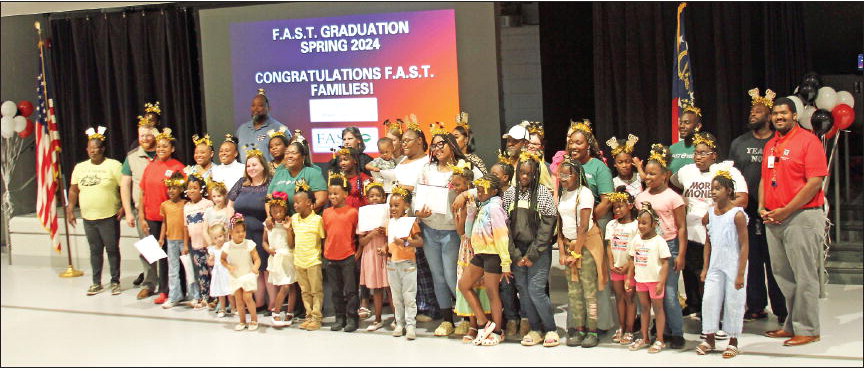
FAST GRADUATES gathered for a photo to commemorate their eight weeks of participation in the first-ever FAST program in Wheeler County.Photo by Deborah Clark
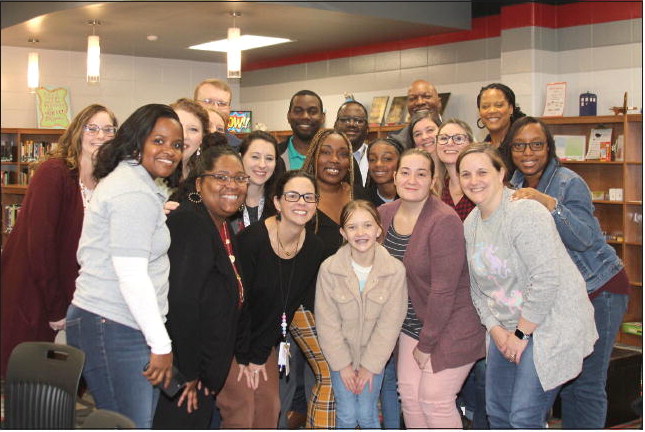
FAST TRAINING — At the beginning of the FAST program, people from the community representing a variety of backgrounds came together to talk about the purpose, guidelines, and implementation of the eight-week undertaking. Shown, back row, from left: Crystal McLamb, Nicole Thornton, Kerri Henderson, Brandon Pope, Willie Coney, William Bell, Theotis Summerset, and Kelly Dougherty-Blount; middle row, from left, Donetta Bracey, FAST supervisor-trainer, Mia Ingram, Jana Murray, Ambi McManus, Amaria Brown, Meredith Conner, Dequera Bell, and April Williams; and front, from left: Samantha Stanley-Bateson, Maya Carrillo, Jenifer Funk, and Marie Carrillo.Photo by Deborah Clark
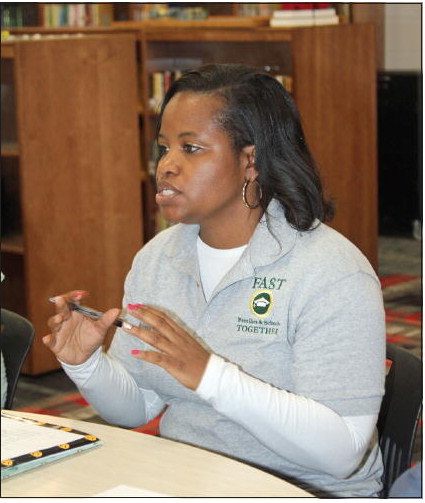
FAST REPRESENTATIVE — Donetta Bracey, FAST Trainer-Supervisor, talks with partners during a training session at the beginning of the eight-week FAST program. She was also present during the graduation and pronounced the Wheeler program a success.Photo by Deborah Clark





